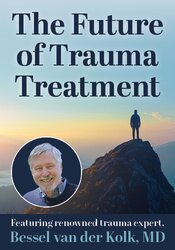

The world’s leading trauma researcher and author of the New York Times bestseller The Body Keeps the Score, Bessel van der Kolk has transformed the way we understand and treat PTSD.
A professor of psychiatry at Boston University Medical School who’s worked with trauma survivors for more than 30 years, he’s shown how we can tap into the body’s here-and-now healing energy by going outside conventional therapy methods to incorporate the therapeutic benefits of sports, martial arts, yoga, and theatre.
Recently, he’s helped bring awareness to the healing potential of psychedelic-assisted therapy, continuing his advocacy for therapeutic innovation in ways that bypass the emotional brain’s notorious resistance to modification by reason or understanding.

Bessel van der Kolk, MD, has spent his career studying how children and adults adapt to traumatic experiences, and has translated emerging findings from neuroscience and attachment research to develop and study a range of potentially effective treatments for traumatic stress in children and adults.
In 1984, he set up one of the first clinical/research centers in the US dedicated to the study and treatment of traumatic stress in civilian populations, which has trained numerous researchers and clinicians specializing in the study and treatment of traumatic stress, and which has been continually funded to research the impact of traumatic stress and effective treatment interventions. He did the first studies on the effects of SSRIs on PTSD; was a member of the first neuroimaging team to investigate how trauma changes brain processes, and did the first research linking BPD and deliberate self-injury to trauma and neglect in early childhood.
Much of his research has focused on how trauma has a different impact at different stages of development, and that disruptions in care-giving systems have additional deleterious effects that need to be addressed for effective intervention. In order to promote a deeper understanding of the impact of childhood trauma and to foster the development and execution of effective treatment interventions, he initiated the process that led to the establishment of the National Child Traumatic Stress Network (NCTSN), a Congressionally mandated initiative that now funds approximately 150 centers specializing in developing effective treatment interventions, and implementing them in a wide array of settings, from juvenile detention centers to tribal agencies, nationwide.
He has focused on studying treatments that stabilize physiology, increase executive functioning and help traumatized individuals to feel fully alert to the present. This has included an NIMH-funded study on EMDR and NCCAM funded study of yoga, and, in recent years, the study of neurofeedback to investigate whether attentional and perceptual systems (and the neural tracks responsible for them) can be altered by changing EEG patterns.
His efforts resulted in the establishment of Trauma Center, that consist of a well-trained clinical team specializing in the treatment of children and adults with histories of child maltreatment, that applies treatment models that are widely taught and implemented nationwide, a research lab that studies the effects of neurofeedback and MDMA on behavior, mood, and executive functioning, and numerous trainings nationwide to a variety of mental health professional, educators, parent groups, policy makers, and law enforcement personnel.
Dr. van der Kolk is the author of the NY Times best-selling book The Body Keeps The Score.
Speaker Disclosures:
Financial: Dr. Bessel van der Kolk is a professor at Boston University School of Medicine, the Director of the Trauma Center, and the National Complex Trauma Network. He receives royalties as a published author. Dr. van der Kolk receives a speaking honorarium, recording royalties, and book royalties from PESI, Inc. He has no relevant financial relationships with ineligible organizations.
Non-financial: Dr. Bessel van der Kolk has no relevant non-financial relationships with ineligible organizations.
The origins of the diagnosis of Post Traumatic Disorder
Complex PTSD
The problem with evidence-based treatment
“Trauma identity.”
The scope of the childhood trauma
The overwhelming issue
The politics of Development Trauma Disorder
Attachment
Polyvagal theory
Brain imaging
Medication and trauma
Please wait ...